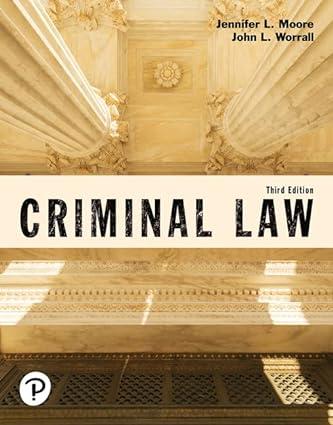Defendant was convicted of soliciting another to rob a bank before the United States District Court for
Question:
Defendant was convicted of soliciting another to rob a bank before the United States District Court for the District of Maine and defendant appealed. The Court of Appeals affirmed the conviction.
After waiving trial by jury, the appellant, Guy Buckalew, was convicted by a federal district court of soliciting James Stewart to commit armed bank robbery. The solicitation statute, 18 U.S.C. § 373, reads as follows:
Whoever, with intent that another person engage in conduct constituting a felony that has as an element the use, attempted use, or threatened use of physical force against the person or property of another in violation of the laws of the United States, and under circumstances strongly corroborative of that intent, solicits, commands, induces, or otherwise endeavors to persuade such other person to engage in such conduct, shall be imprisoned . . . .
18 U.S.C. § 373 (Supp. III 1985) (emphasis added). The statute required the government to show two elements. First, the government had to show, through strongly corroborative circumstances, that Buckalew had the intent that Stewart commit armed bank robbery. Second, the government had to show that Buckalew induced or otherwise tried to persuade Stewart to commit armed bank robbery. The district court found the evidence more than sufficient to make these showings; and so do we.
The record included evidence showing the following:
(1) In October 1986, Buckalew met Stewart at a halfway house for recovering alcoholics and learned that Stewart was awaiting sentence for armed robbery.
(2) In April 1987, Buckalew met Stewart again in Auburn, Maine. On April 22, Buckalew asked Stewart if he wanted to make some “fast cash.” Buckalew said he had been “looking over” the Key Bank at the Promenade mall in Lewiston;
he said he would help Stewart with a “little nest egg ; ” he said that Stewart’s wife and children could use the money;
he said it would be easy to rob the bank; and he asked Stewart to get a car and a gun to use in the robbery.
(3) Buckalew and Stewart met again over the next few days.
On Friday, April 24, the FBI (whom Stewart had told of the plans) saw Buckalew and Stewart drive up to the Key Bank, sit outside in the car, drive away, return, and enter the mall in which the bank was located. On Monday, April 27, they returned to the bank. The FBI (using a recording device) heard Buckalew tell Stewart
(a) that they needed a car, which perhaps they would “steal,”
(b) that he knew the bank from prior visits,
(c) that Buckalew should disguise his face with a stocking for the robbery,
(d) that “somebody’s just got to hold the gun and watch them gals while the other gets the money,” and
(e) that after the robbery they would return to his or Stewart’s place “to split [the money] up.”
(4) On April 29, Stewart saw Buckalew again. Buckalew told him the robbery would take place on May 1 and that, in order to buy a getaway car, he wanted Stewart’s help collecting some money he was owed.
The record shows that Buckalew had been drinking prior to some of these meetings but there is no evidence of intoxication when he and Stewart sat outside the bank on April 24 and 27. The record also contains evidence that Buckalew threatened Stewart in an effort to persuade him to help rob the bank, but the district court apparently did not take that evidence into account in rendering its verdict.
This summary should indicate why we have concluded, after examining the record, that the evidence was more than sufficient to show Buckalew’s intent to have Stewart help him rob the Key Bank and to show that Buckalew, “under circumstances strongly corroborative of that intent,” solicited, induced and tried to persuade Stewart to help with the robbery . . .
Buckalew also argues that the solicitation statute is unconstitutionally vague. The question is whether, looking at the statute “ ‘in light of the facts of the case at hand, ’ the statute “ ‘provide[s] a constitutionally adequate warning to those whose activities are governed.’ ” Here, the language of the solicitation statute picks out those who persuade others to commit a violent crime, seriously intending that they do so. In our view, it is virtually self-evident that a person who offers “fast cash” to another (whom he knows was previously involved in armed robbery) to rob a bank; says there “is nothing easier to do than a bank; ” discusses the robbery on several occasions; goes to the bank with this other person and describes details of the robbery, including the need for a gun and a car; and specifies the robbery date-is a person who should know that this language applies to him. We are aware of no legal authority suggesting the contrary. Buckalew argues that the solicitation statute, if constitutional, brings within its scope much activity that also falls within conspiracy statutes. We agree that Congress may have intended that result. See S. Rep. No.
97–307, 97th Cong., 1st Sess. 179 (stating that the “principal reason” for the statute is “to cover the situation where a person makes a serious effort to induce another to engage in conduct constituting a crime but is unsuccessful in doing so” and that “if the solicitee agrees to engage in criminal conduct and an overt act is performed to effect an objective of the agreement, the solicitor would be guilty of conspiracy”). But, we do not see why that fact would make the statute unconstitutional.
The judgment of the district court is AFFIRMED.
Questions:-
1. What are the elements of solicitation required under the federal statute, 18 U.S.C. § 373?
2. How does the First Circuit rule on defendant’s vagueness challenge?
Step by Step Answer:






